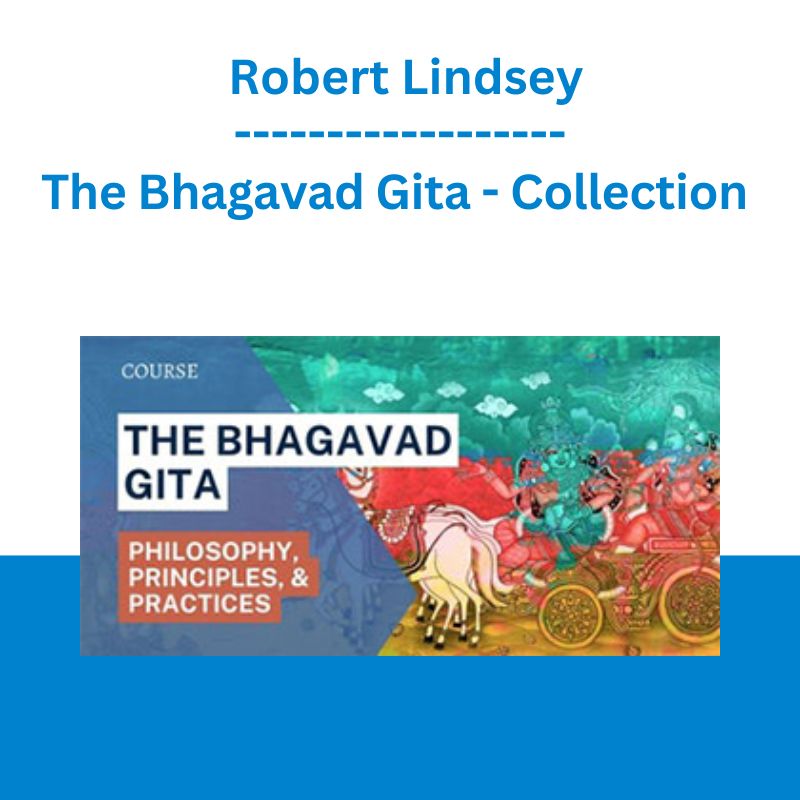*** Proof of Product ***
Exploring the Essential Features of “The Bhagavad Gita – Collection – Robert Lindsey”
The Bhagavad Gītā is likely the seminal pre-modern South Asian Sanskrit text; it has captured the imagination of popular and scholastic audiences in India and around the world for centuries. As a yoga text, it highlights the paths of devotion (bhakti), action (karma), knowledge (jñana), as well as that of meditation (dhyāna). The Gītā, as it commonly referred, has been translated in over seventy-five languages and is often referred to as a “spiritual classic.” But it is also a text with a rich history and specific literary context. It is not an independent literary work, but rather occupies a place within the great Indian epic, Mahābhārata. The Gītā has also played a central role in various political and theological movements. This course explores the content of Bhagavad Gītā—with a special emphasis of yoga—in addition to its Epic literary context, role in history, and its interpretation within commentarial traditions.
Module 1: Literary Context
In this module students will learn the narrative context for the Bhagavad Gītā within the Mahābhārata epic. Students will learn about important characters and themes from the Gītā’s backstory that are most relevant to understanding the text.
Module 2: Historical Context and Introduction to Commentary
In this module students will learn some of the historical context surrounding the Bhagavad Gītā.Students will learn perspectives concerning the dating and authorship of the text. Students will also learn how the text has been interpreted from various religio- philosophical perspectives. Students will be introduced to the concept of commentary and two prominent Vedāntic interpretations of the text: that of the 9th CE Śankara and 11th CE Rāmānuja (the tradition of modern yoga gurus Krishnamacarya and BKS Iyengar). Students will learn about the religio-philosophical impact of the Gītā through commentary and the diversity of interpretations to the primary text.
Module 3: Metaphysical Context & Yoga of Dejection
In this module students will learn about the metaphysics presented in Bhagavad Gītā, such as the qualities of material nature, soul, God, dharma, karma, and transmigration. Students will learn about Arjuna’s despondency at the brink of battle and explore allegorical interpretations of the text.
Module 4: Karma Yoga & Jñana Yoga
In this module students will learn about the paths of action and knowledge as presented in the text. While both paths are validated in the text, students will explore the rationale behind prioritizing one path over another within this context.
Module 5: Dhyāna Yoga & Parallels to Patañjali’s Yoga Sūtras
In this module students will learn about the prescriptions for meditation practice in the text. These verses will be compared with similar verses and concepts from Patañjali’s Yoga Sūtras. Students will also learn how the text responds to the question: what happens to the unsuccessful yogi?
Module 6: Bhakti Yoga & Krishna’s Cosmic Form
In this module students will learn about the path of devotion that is outlined in the text. Krishna’s cosmic form, a double identity to his role as friend and teacher within the text, will also be explored. Students will learn about the efficacy of the Gītā’s bhakti yoga and its distinction from previously discussed yogic paths.
Module 7: Conclusion & Final Instructions
In this module students will learn about the conclusion of the text and Krishna’s final message to Arjuna. An emphasis will be placed on two prominent Vedāntic interpretations of the text: that of the 9th CE Śankara and 11th CE Rāmānuja.
Module 8: Translation, Interpretation & Politics
In this module students will be introduced to the modern history of the Gītā’s translation and interpretation. Students will learn about different types of translation projects and how the Gītā has been interpreted and deployed within political contexts.
Students who take this course will:
Become familiar with the literary context of the Bhagavad Gītā within the Mahābhārata
Become familiar with the rich and varied historical context of Bhagavad Gītā, specifically surrounding politics and religio-philosophical systems
Acquire knowledge of the fundamental metaphysical concepts of the text
Acquire knowledge of karma yoga, jñana yoga, and bhakti yoga
Learn about the efficacy of the Gītā’s bhakti yoga and its distinction from other yogic paths
Become familiar with the text’s meditative prescriptions and their parallels and differences to Patañjali’s Yoga Sūtras
Acquire knowledge of Krishna’s doubleness and his final instructions at the conclusion of the text
Become familiar with the concept of the Sanskrit commentarial tradition and its importance in providing coherent yet varied interpretations of the text
Author
Robert Lindsey
Robert Lindsey is an Adjunct at Rutgers University where he co-teaches the winter session study abroad course in Hinduism. He has given numerous guest lectures at Rutgers on topics such as Bhagavad Gita, Bhagavata Purana, Patanjali’s Yoga Sutras, Mahabharata, and Hinduism and the Afterlife. Robert is the Director of Yoga Philosophy and History at Yoga Vida NYC, where he teaches in teacher training programs and workshops. He has a BA in Politics from Princeton University and did post baccalaureate study at Rutgers University and the Jiva Institute in Vrindavan, India. He has a MA in South Asian Religious Studies from Columbia University, where he also studied Sanskrit. He also studied Sanskrit at the American Institute of Indian Studies in Pune, India.
Please see the full list of alternative group-buy courses available here: https://lunacourse.com/shop/










 Crypto Dan - The Crypto Investing Blueprint To Financial Freedom By 2025
Crypto Dan - The Crypto Investing Blueprint To Financial Freedom By 2025  Oliver Velez - Essential Strategy Of Trade For Life
Oliver Velez - Essential Strategy Of Trade For Life  Sovereign Man Confidential - Renunciation Video
Sovereign Man Confidential - Renunciation Video  Fred Haug - Virtual Wholesaling Simplified
Fred Haug - Virtual Wholesaling Simplified  Matan Feldman - The 13-Week Cash Flow Modeling - Wall Street Prep
Matan Feldman - The 13-Week Cash Flow Modeling - Wall Street Prep  Greg Loehr - Advanced Option Trading With Broken Wing Butterflies
Greg Loehr - Advanced Option Trading With Broken Wing Butterflies  Chris Capre - Advanced Price Action Ongoing Training & Webinars
Chris Capre - Advanced Price Action Ongoing Training & Webinars  The Daily Traders – Exclusive Trading Mentorship Group
The Daily Traders – Exclusive Trading Mentorship Group  Dave Landry - Stock Selection Course
Dave Landry - Stock Selection Course  Jesse Livermore Trading System - Joe Marwood
Jesse Livermore Trading System - Joe Marwood  Akil Stokes & Jason Graystone - TierOneTrading - Trading Edge 2019
Akil Stokes & Jason Graystone - TierOneTrading - Trading Edge 2019  SMB - Options Training
SMB - Options Training  Trade Like Mike - The TLM Playbook 2022
Trade Like Mike - The TLM Playbook 2022  Alphashark - The AlphaShark SV-Scalper
Alphashark - The AlphaShark SV-Scalper  Team NFT Money - Ultimate NFT Playbook
Team NFT Money - Ultimate NFT Playbook  James Coyne - Strategic Couples Therapy
James Coyne - Strategic Couples Therapy  Atlas API Training - API 570 Exam Prep Training Course
Atlas API Training - API 570 Exam Prep Training Course  George Fontanills & Tom Gentile - Optionetics Wealth Without Worry Course
George Fontanills & Tom Gentile - Optionetics Wealth Without Worry Course  John Greene - The Great Tours: France through the Ages
John Greene - The Great Tours: France through the Ages  Money Miracle - George Angell - Use Other Peoples Money To Make You Rich
Money Miracle - George Angell - Use Other Peoples Money To Make You Rich